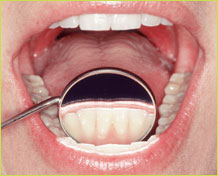The health of your mouth can alert your dentist to problems in other parts of the body.
Dr. Walter Sepe, a board-certified periodontist, has treated many patients who didn't know they had diabetes. "Many of these individuals had no idea. Their mouth, however, didn't look healthy, particularly for their age and medical history. There was more inflammation and bone loss around the teeth than I'd see in a healthy individual."
It's not unusual for diseases in other parts of the body to produce signs and symptoms in the mouth. In fact, many diseases and conditions are first detected by dentists during regular checkups. "The mouth is really the window to the body," says Dr. Sepe. "Dentists see signs of a variety of health problems, and often refer patients to their physicians for follow-up."
Here's a look at some of the diseases and conditions that show signs in the mouth, and how your dentist may detect them.
Diabetes
What it is
A disease in which your blood glucose (sugar) levels are too high. Complications of diabetes can include heart disease, stroke, amputations, and blindness.
Signs and symptoms in the mouth
- Gum disease (bleeding and/or swollen gums)
- Unusually dry and irritated mouth tissue
- Foamy saliva
- Gums pulled away from your teeth
- Fungal infections
- A change in the way your teeth fit when you bite
- Bad breath or a bad taste in your mouth
Facts to know
Nearly 5.7 million people are unaware they have diabetes. That's one-quarter of those who have the disease.
Bulimia
What it is
An eating disorder in which people eat an unusually large amount of food (binging), then try to "undo" the binge by getting rid of food (purging). This may be done by making themselves vomit, taking laxatives, exercising too much, or not eating. In addition to damage caused to the mouth by stomach acid, bulimia can result in heart, kidney, and bone problems.
Signs and symptoms in the mouth
- Worn or discolored tooth enamel
- Increase in the number of sensitive and decaying teeth
- Swelling in jaw or cheek area
- Dry, cracked lips
- Small bruises or ulcers on the roof of the mouth
- A chronic sore throat
Facts to know
People with bulimia often hide their binging and purging, so the disease can go undetected for years. If a dentist recognizes the problem, he or she can encourage patients to get help. Since many people with bulimia are teenagers, dentists can also alert parents to the disorder.
HIV and AIDS
What it is
HIV is the virus that causes AIDS. It attacks the immune system, which makes it more difficult for the body to fight infections. AIDS is the final stage of HIV infection.
Signs and symptoms in the mouth
- Gum disease (bleeding and/or swollen gums, as well as dry mouth)
- Herpes - red sores on the roof of the mouth or outside of lips
- White patches that are sometimes thick and hairlike
- Thrush - white or yellowish patches with redness or bleeding underneath
- Warts - small bumps that are usually white, gray, or pinkish
Facts to know
Once someone is diagnosed with HIV/AIDS, keeping close track of their oral health is one way to determine the health of their immune system. Certain conditions may appear when the immune system starts to weaken, while others are seen as the syndrome progresses.
Leukemia
What it is
Cancer that causes large numbers of blood cells to be produced and enter the bloodstream.
Signs and symptoms in the mouth
- Gum disease (bleeding and/or swollen gums)
- Mouth ulcers
- Enlarged tonsils
- Sore throat
Facts to know
Gingivitis (mild gum disease) is the first sign of leukemia in many children with the cancer. In 2008, about 4,220 children and 44,270 adults are expected to develop leukemia.
Oral Cancer
What it is
Cancers of the mouth and pharynx, part of the throat.
Signs and symptoms in the mouth
- A sore, irritation, lump, or thick patch in your mouth, lip, or throat
- White or red patches that last for weeks
- A feeling that something is caught in your throat
- Difficulty chewing or swallowing, or moving your jaw or tongue
- Numbness in your tongue or other areas of your mouth
Facts to know
Oral cancer is one of the deadliest cancers. Only about 6 out of 10 people diagnosed with oral cancer survive for more than five years. Early detection can help significantly improve survival rates.





 Dentists can help keep your mouth and body healthy, but they can't do it without you. Following these tips can help protect your oral health:
Dentists can help keep your mouth and body healthy, but they can't do it without you. Following these tips can help protect your oral health:
